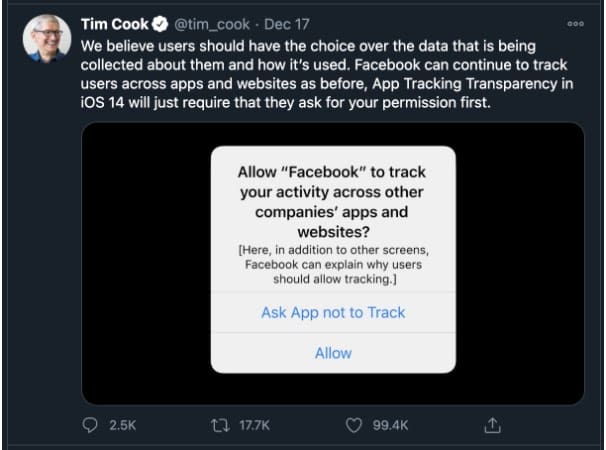Sometimes one value comes into awkward tension with another. We value freedom of speech, for example, but we also want to prevent the spread of misinformation about the winner of the US election or the efficacy of COVID-19 vaccines.
When it comes to our online behaviour, there’s a similar tension between our desire for privacy and our enjoyment of a personalised digital experience that tailors information, products or services to our interests.
That tension between personalisation and privacy is at the heart of the recent tussle between digital giants Apple and Facebook.
What’s all the fuss about?
Apple’s new iOS14 update includes a feature called App Tracking Transparency (ATT). When you install an app, you’ll now get a prompt telling you what information the app wants to track. Then you’ll get two options: 1) tell the app not to track or 2) allow tracking.
What would you do? It seems likely that most people will prioritise their privacy and ask apps not to track them, especially as this is presented as the first option.
How does the iOS14 update affect Facebook ads?
It’s very new so we don’t really know yet; we can only speculate based on users’ likely behaviour and Facebook’s existing ad system (which will no doubt recalibrate in response to the iOS14 update).
Many businesses use targeted Facebook ads to promote their products or services. It makes sense: about 15 million Australians (about 60% of the population) are active Facebook users.
Apple now requires any app sold in the App store to include the new tracking prompt. That means Facebook’s app has to include the opt-out-of-tracking prompt too. Facebook says, ‘…we have no choice but to show Apple’s prompt. If we don’t, they will block Facebook from the App Store…’
If more and more people opt-out of Facebook tracking, it may water down the effectiveness of Facebook ads that target a particular group based on their behaviour or interests because this information won’t be available.
Retargeting campaigns are likely to suffer most. Those are based on reminding people about the products they’ve browsed and/or purchased on your website, mobile app, Facebook Marketplace or Instagram Shopping. This information will no longer be available for those who opt-out of tracking meaning the size of your retargeting audience will shrink.
How Facebook advertising has worked so far
Facebook’s ad manager enables you to target campaigns to certain groups who are most likely to respond.
If you wanted to recruit people to a weight loss clinic, for example, you could create your target group using information like:
- Their lifestyle (newlyweds and new parents tend to gain weight)
- Their household composition (couples or families with children in the home)
- Their (sometimes conflicting) interests:
- Gym members – they aspire to be healthy even if they don’t actually exercise much
- Fast food – they follow KFC, Uber Eats and Dunkin Donuts so their diet could probably do with improvement.
- Their location (if you’re trying to draw them into a local practice rather than an online one).
You can’t target people’s personal attributes, such as race, ethnicity, sexual orientation, health status and religion (among a long list). Don’t use pronouns in Facebook ads about health conditions since that’s personal information.
Once you’ve decided on your audience, you can then target your ads to a user’s preferences. Dynamic formats and ad creative were designed to meet people at their stage of the customer journey by delivering a personalised version of the ad to each person who saw it. One buyer might be persuaded by a ‘free shipping’ message, for example, while another was more likely to be influenced by seeing the exact price of the goods alongside a photo. Those tailored ads yielded a higher return on ad spend.
Will my Facebook ads still work after iOS14?
Ultimately, yes, but they may work a little differently. Targeting for behaviour and interests may no longer work quite as well but, instead, Facebook is likely to optimise for users who take a specific action.
Facebook’s algorithms will learn how to adapt to the new changes. Ad campaigns may take a little longer to complete their learning phase so you may need to shift your expectations for young campaigns.
Let’s also remember that Android users are not affected by Apple’s choices. While iPhones are popular in Australia, Android still leads at 55.9% of all sales (though this has dropped from 59% a year earlier).
What else do I need to know?
One important new change is Facebook’s attribution window, which has shrunk from 28 days to just 7 (this is their choice and nothing to do with Apple).
Particularly for high-value purchases or commitment to a lifestyle change, people often need time to weigh up their options and decide. Previously, some might have clicked your ad, then eventually filled in your form 3 weeks later and this would still show up as a conversion in your reporting. With the new 7-day window, this would no longer be counted. You may still have gained the customer but you wouldn’t be able to trace it to the success of your campaign. That makes you less sure of what worked and what didn’t.
Google also uses a 7-day attribution window as its default so at least the two systems now dovetail and your website conversion reporting will match up with Facebook.
How can Splice Marketing help?
As experienced marketers, we’ve adapted to many different policy changes and algorithm updates. This one is no different. We’ll continue to find innovative ways to help our clients get their message out to people who need to hear it.
Most of the ad campaigns we run are optimised for ad clicks rather than conversions because it is hard to achieve enough conversions within a 7-day window for campaigns to exit the learning phase. Conversions are easier to achieve for impulse buys like shoe sale ads rather than health care, which people take more seriously (as they should).
As you can see, there is a great deal that goes on behind the scenes to make your marketing effective. It’s not as simple as ticking a few boxes on Facebook and paying for your ad. There are complex decisions behind audience targeting, keyword optimisation, and calls to action. There are also creative ways to circumvent some potholes if you know what you’re doing.
If you’re keen to market your practice through Facebook ads but would like help to create the most effective campaign possible, then please contact the team at Splice Marketing. We’d love to help.





